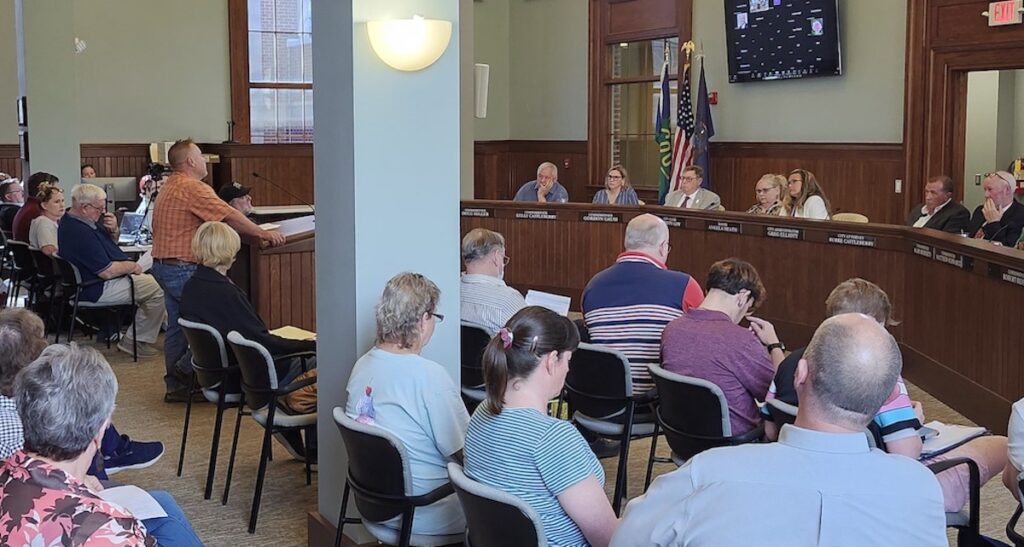
ADRIAN — A closely divided Adrian City Commission voted 4-3 on June 3 to enact a controversial point-of-sale inspection ordinance.
The ordinance, which will go into effect six months from now, requires any residential dwelling being sold to undergo an exterior inspection for items such as peeling paint, damaged windows, rotting wood, roofs in need of repair, or junk accumulation. Residences will have to pass the inspection to be sold, unless the seller agrees to put aside sufficient money for the buyer to make repairs.
Voting “yes” were Commissioners Kelly Castleberry, Gordon Gauss, Doug Miller, and Matt Schwartz.
Voting “no” were Mayor Angie Sword Heath and Commissioners Bob Behnke and Mary Roberts.
The commission heard public comments from 18 people, the majority of whom were against the ordinance.
The most common objections were that it would place a burden on older and low-income homeowners and that the city should look first to stronger enforcement of rules that are already on the books.
“The city of Adrian has many, many ordinances. They’re not being enforced,” Russell Richards of Adrian said.
“There’s a medley of ordinances that are at your disposal,” said Bill Swift of Tecumseh, chairman of the Lenawee County Democratic Party.
Jeff Rising of Adrian, a Realtor and former Adrian city commissioner, said point-of-sale inspections are not the right tool for combatting blight.
“I don’t want you to confuse people being in favor of blight removal with people being in favor of this ordinance,” he said.
Angie Verner, a Realtor who said she lives in Raisin Township but owns property in Adrian, said she’s talked to people in Washtenaw County who do point-of-sale inspections, and they said it’s often sad because the sellers whose homes they’re inspecting can’t afford to make the repairs that their local ordinances require of them.
“The people that are hurt the most are people who are trying to sell their house because they can’t afford to keep it,” she said.
Realtor Mary Clymer said that waiting for properties to go on the market won’t do anything about blight right now.
Two people spoke in favor of the ordinance. Brad Watson, a former city commissioner, said that even if homebuyers negotiate a lower price because the house they’re buying has problems, that’s no guarantee that they’ll actually fix those problems after buying. He also said that commissioners should make their decision based on what they feel is best for the community, even if there is vocal opposition.
“You have been elected to make this decision on behalf of all residents, current and future,” he said.
Jim Kapnick of Adrian said that because sellers would have to put money aside for repairs in order to sell a home that doesn’t pass inspection, homebuyers who may have already put all of their resources into buying a house will have money available to fix it up.
He also said the ordinance would be an additional tool for fighting blight.
“Blight is a significant issue throughout our community and we must use every tool possible to eliminate it,” he said.
Commissioner Gordon Gauss disagreed with those who characterized the ordinance as west-side residents dictating to the east side or a case of government overreach.
“From my point of view it’s an attempt to beautify our city and improve our quality of life,” he said.
Commissioner Kelly Castleberry said point-of-sale inspections are a good alternative to traditional code enforcement through fines and the court system, which she said is punitive and ineffective.
“Traditional code enforcement does not work,” she said.
Commissioner Bob Behnke, who is retired as superintendent of Adrian Public Schools, said the debate reminded him of working on the school district’s unsuccessful bond issue in 2015. He said he thought the district had a good plan, but the bond issue’s failure “forced us to take a hard stop and a deep breath and really listen to our community.”
“We have to go back and create a better plan that our residents can respect and honor,” he said.
Noting that the city will has been awarded about $470,000 in state funds to help homeowners make repairs, Behnke proposed that the city identify Adrian’s most blighted residential properties, approach those homeowners with information about how to get funding, and “provide a warm, friendly hand.”
Mayor Angie Sword Heath said she visited another city where officials said a point-of-sale inspection ordinance was working well for them, but that community’s average income was $20,000 higher than Adrian’s and their poverty rate was 8 percentage points lower.
“There are vast differences that might make a point-of-sale ordinance not the right fit for us,” she said.
Heath also said she was concerned that the ordinance would lead to more people holding onto deteriorating houses instead of selling them.
After the vote, Commissioner Mary Roberts, who had joined Behnke and Heath in opposing the measure, said the point-of-sale ordinance doesn’t have to be in place forever. She said the city can try it for a couple of years and, if it isn’t working, either amend or rescind it.
“Ordinances are changed and rescinded every day in communities across the country,” she said.
Links:
Previously:

